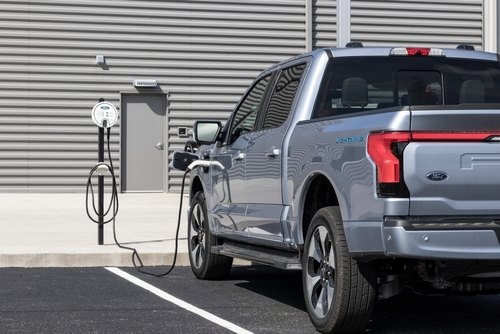Ford Celebrates EV Still Being Eligible for Tax Credits

On Wednesday, Ford Motor Co. celebrated the fact that its entire electric-vehicle lineup would still be eligible for consumer incentives under the so-called Inflation Reduction Act federal tax credit scheme. But it downplayed that some of those models won’t be eligible for the maximum amount due to stricter EV sourcing requirements pertaining to battery components and critical minerals.
“Customers made Ford the No. 2 electric vehicle brand in the U.S. last year, and as we scale our production to build more EVs for more customers, we believe this new incentive eligibility will help even more Americans join the EV revolution,” Marin Gjaja, chief customer officer for the company’s electric vehicle division, stated.
It might. But Ford is also expecting the EV side of the business (Model e) to lose $3 billion this year before it manages to swing an 8 percent pre-tax margin by the end of 2026. The brand’s EV sales certainly have been healthy, showing a 41 percent increase in sales through the first quarter of 2023. Though it’s worth mentioning that Blue Oval has only recently started ramping up production on what are mostly brand-new electric models.
Based on information provided by the manufacturer, only the Ford F-150 Lightning pickup truck and Lincoln Aviator Grand Touring will be eligible for the full $7,500 credit. Meanwhile, the Ford Mustang Mach-E, E-Transit, Escape Plug-In Hybrid, and Lincoln Corsair Grand Touring will cap out at $3,750.
This is down to new guidance issued by the U.S. Treasury Department late last week. For 2023, each vehicle needs to have at least 40 percent of the critical minerals contained within the battery to be extracted or processed in the United States — or a country with which the United States has a free trade agreement — in order to qualify for a $3,750 credit. Battery component requirements offer up another $3,750 and cite that 50 percent of the value of the battery components must be manufactured or assembled inside North America.
The above quotas increase annually, meaning that the credits are subject to change between model years. Customers can likewise get around the 2023 limitations by buying a vehicle before the new rules come into effect on April 18th — in which case the tax credit defaults to the old rules at $7,500.
Expect other manufacturers to begin listing which of their electric vehicles' qualify under the updated rules over the coming weeks.
[Image: Jonathan Weiss/Shutterstock]
Become a TTAC insider. Get the latest news, features, TTAC takes, and everything else that gets to the truth about cars first by subscribing to our newsletter.

A staunch consumer advocate tracking industry trends and regulation. Before joining TTAC, Matt spent a decade working for marketing and research firms based in NYC. Clients included several of the world’s largest automakers, global tire brands, and aftermarket part suppliers. Dissatisfied with the corporate world and resentful of having to wear suits everyday, he pivoted to writing about cars. Since then, that man has become an ardent supporter of the right-to-repair movement, been interviewed on the auto industry by national radio broadcasts, driven more rental cars than anyone ever should, participated in amateur rallying events, and received the requisite minimum training as sanctioned by the SCCA. Handy with a wrench, Matt grew up surrounded by Detroit auto workers and managed to get a pizza delivery job before he was legally eligible. He later found himself driving box trucks through Manhattan, guaranteeing future sympathy for actual truckers. He continues to conduct research pertaining to the automotive sector as an independent contractor and has since moved back to his native Michigan, closer to where the cars are born. A contrarian, Matt claims to prefer understeer — stating that front and all-wheel drive vehicles cater best to his driving style.
More by Matt Posky
Latest Car Reviews
Read moreLatest Product Reviews
Read moreRecent Comments
- Varezhka I have still yet to see a Malibu on the road that didn't have a rental sticker. So yeah, GM probably lost money on every one they sold but kept it to boost their CAFE numbers.I'm personally happy that I no longer have to dread being "upgraded" to a Maxima or a Malibu anymore. And thankfully Altima is also on its way out.
- Tassos Under incompetent, affirmative action hire Mary Barra, GM has been shooting itself in the foot on a daily basis.Whether the Malibu cancellation has been one of these shootings is NOT obvious at all.GM should be run as a PROFITABLE BUSINESS and NOT as an outfit that satisfies everybody and his mother in law's pet preferences.IF the Malibu was UNPROFITABLE, it SHOULD be canceled.More generally, if its SEGMENT is Unprofitable, and HALF the makers cancel their midsize sedans, not only will it lead to the SURVIVAL OF THE FITTEST ones, but the survivors will obviously be more profitable if the LOSERS were kept being produced and the SMALL PIE of midsize sedans would yield slim pickings for every participant.SO NO, I APPROVE of the demise of the unprofitable Malibu, and hope Nissan does the same to the Altima, Hyundai with the SOnata, Mazda with the Mazda 6, and as many others as it takes to make the REMAINING players, like the Excellent, sporty Accord and the Bulletproof Reliable, cheap to maintain CAMRY, more profitable and affordable.
- GregLocock Car companies can only really sell cars that people who are new car buyers will pay a profitable price for. As it turns out fewer and fewer new car buyers want sedans. Large sedans can be nice to drive, certainly, but the number of new car buyers (the only ones that matter in this discussion) are prepared to sacrifice steering and handling for more obvious things like passenger and cargo space, or even some attempt at off roading. We know US new car buyers don't really care about handling because they fell for FWD in large cars.
- Slavuta Why is everybody sweating? Like sedans? - go buy one. Better - 2. Let CRV/RAV rust on the dealer lot. I have 3 sedans on the driveway. My neighbor - 2. Neighbors on each of our other side - 8 SUVs.
- Theflyersfan With sedans, especially, I wonder how many of those sales are to rental fleets. With the exception of the Civic and Accord, there are still rows of sedans mixed in with the RAV4s at every airport rental lot. I doubt the breakdown in sales is publicly published, so who knows... GM isn't out of the sedan business - Cadillac exists and I can't believe I'm typing this but they are actually decent - and I think they are making a huge mistake, especially if there's an extended oil price hike (cough...Iran...cough) and people want smaller and hybrids. But if one is only tied to the quarterly shareholder reports and not trends and the big picture, bad decisions like this get made.


































Comments
Join the conversation
If EV's are such awesome and price competitive products why is the tax credit necessary? OH, they aren't competitive, are they.
I look at these electric vehicles kind of like toys, or Minis. Sales will be strong initially for those that want one, but then tail off. Many (most of us) do not want an electric car. If anything, a Hybrid makes so much more sense but of course doesn't fit the Green Freaks agenda.